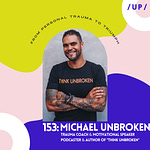Julian Gavino (he/him) is a trans-masculine model, writer, coach, and sex-positive disability influencer living with Ehlers-Danlos syndrome and comorbidities. An outspoken advocate for both the trans and disability communities, Julian grew up never seeing people in media who “looked like” him…and his work has become a direct response to that experience. Many may know Julian through his Instagram account @TheDisabledHippie, which he started during a health crisis while in college for neuropsychology. Now a coach serving the disabled and LGBTQIA+ communities, he has also become a social media expert and co-founder of Disabled with Dignity, a platform featuring disabled stories — by disabled people, for disabled people. In his work, Julian aims to normalize and destigmatize trans and disabled bodies in media — by facing discrimination down and creating space for representation.
Tune in as Julian shares:
that he started experiencing symptoms from the age of 5, from digestive distress to dislocations — and was initially diagnosed with Celiac
that he largely uses his wheelchair these days, in order to support his mobility
that he was recently diagnosed with Hashimoto’s disease, but has been monitoring his thyroid health from an early age
that as far as he knows, most of his diagnoses are likely connected to EDS
the most significant impact on his health in his adult life: his neurological conditions, including a demyelinating neuropathy similar to MS that can flare without warning
the emotional toll of his health conditions — from awareness of mortality to a young age, to the validation of diagnosis
that growing up female meant that he was gaslighted over his health frequently
how he stepped into self-advocacy
that he started his Instagram feed as a way to manage his emotional journey through disability
that his treatments include infusions, a feeding tube, multiple medications, physical therapy, and more
the supportive role his service dog, Atlas, has played in his life — both physically and emotionally
how his gender identity has influenced his experiences within the medical system — including threats to his safety from professional caregivers
his thoughts on healthcare reform














Share this post